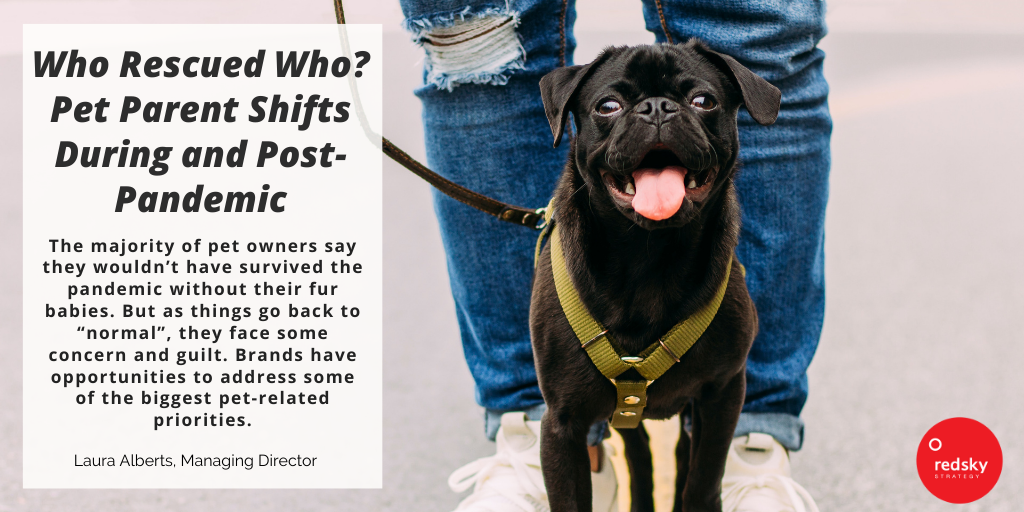News
Pet Parent Shifts During and Post-Pandemic: Who Rescued Who?

Image Credit: https://unsplash.com/photos/-JsZ6o5nIhs
Amid the lockdowns and subsequent periods of isolation ushered in by the pandemic, there was an increased need and desire for animal companionship. In fact, a whopping 23 million American households added a pet during COVID-19, and most will not consider rehoming them. Pet parents bonded more closely and invested more in their pet. One Money and Morning Consult study found that the majority of people who owned pets value their pets more (58%) and are more affectionate (50%) than they were in pre-pandemic. Those who adopted fur babies are now worried about leaving them alone while returning to work, be it on a full-time or hybrid basis.
A Peak At Pandemic Pet Ownership
Similar to human parents, pet parents are experiencing feelings of stress and guilt post-pandemic. A recent Wag! survey found that:
- 41% of pet parents say that they will miss their pets more than they will their spouses or children after returning to work
- 76% of new dog parents who adopted pets during the pandemic worry about pet care challenges they will face while returning to work
According to a Kinship report, the majority of pet owners (71%) say that they wouldn’t have survived the tumultuous year of 2020 without their furry friends, and 81% agree that the year would’ve taken a greater emotional toll on them if they didn’t have their pet. Moreover, 62% of pet parents agree that their top priority is their pets’ happiness.
Millennials, in particular, are a generation of pet owners; 76% of them owning a pet.
The pandemic was a perfect storm to boost pet ownership as people sought out something to fulfill their lack of companionship and provide a reprieve from the stress and fear surrounding COVID. Pets also make for great exercise buddies and can help incentivize and motivate people to get out of the house.
To many, pets are family members. The opportunity to care for another being brings love, affection, and responsibility into one’s life. It’s cherished and real, and something many pet owners make a key priority in their lives.
Stress and Guilt Plaguing Pet Parents
The notion that pet parents are parents is controversial. However, the act of nurturing is to be human. It’s unsurprising that brands found new opportunities to encourage better pet nutrition and preventative healthcare.
The biggest stressors pet parents experience regarding their pets are them getting sick (76%), having a chronic or long-term illness (73%), or experiencing unknown health issues (73%). In addition, 77% of pet owners are worried about their pet’s future health.
Although costs factor into pet parent concerns, the Kinship report found that they are still eager to spoil their fur babies by buying them food and treats (85%), toys (78%), and clothing (48%). They also choose pet products based on the pet’s health/wellness (86%) over the cost (14%). In fact, in 2020, Americans spent over $103 billion on their furry friends, a $6 billion increase from the year before.
Brands Tapping Into Pets and Owners’ Bond
Pet parents’ deep bond and dedication to the happiness and well-being of their pets presents brands with opportunities to focus on improving the lives of their animals. This can include everything from encouraging better nutrition, such as PremieRpet to seeking services for preventative health with a facility such as Banfield Pet Hospital.
Marketers and advertisers alike have authentic opportunities to tap into pet lovers’ hearts. Historically, puppies and kittens have been tried and true winners in advertisements. Today’s pet parents are even more open and invested in their pets than when ads with puppies and kittens were used, which translates to a willingness to appropriately invest in their healthcare and wellbeing, from playing and exercising to nutrition and insurance.
This is something pet retailers such as Chewy have embraced: the idea that the owners’ needs are just as important and relevant as the pet they’re shopping for. As Forbes pointed out, the average lifespan of a dog ranges from 10 to 13 years. For the pet industry, this uptick in pet ownership offers at least a decade-long opportunity.
These trends aren’t just important for animal-related brands to leverage, either. Brands that focus on family well-being have more permission to dip into pet care and wellness. The opportunity for the play and support of a pet can touch any pet parent’s heart.
“A pet and a pet parent in their life cycle have greater needs than just buying food or toys or accessories,” Chewy CEO Sumit Singh explained to Forbes. “There are real health care needs, there are real services needs, and we have an obligation to connect those.”
Learning how people are changing and adapting their attitudes and behaviors to make space for their definition of family is crucial for brands, especially as we enter a post-pandemic world where many values and interests have shifted. Building authentic and lasting relationships with customers has incredible benefits. Being able to do so respectfully can help attract loyalty from pet parents. To understand the way people act and think about their pets and pet care, we leverage tools like Indaba, or storytelling. Stories illuminate nuance that go deeper to connect with emotions and can provide a context that can transform an idea into an actionable insight.
Interested in working with RedSky Strategy? Get in touch to learn how we use deep storytelling techniques such as Indaba and online communities to help brands and marketers create better products and connect most relevantly with their customers.
